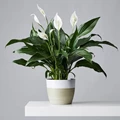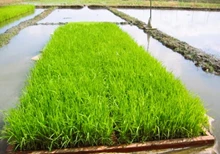
Houseplant fertilizers provide all of the nutrients that indoor plants require to grow. The finest indoor plant fertilizers should have a mineral balance to promote strong roots, lush foliage, and attractive blooms. Houseplant fertilizers can take the form of liquid plant food, nutrient-rich granules, or slow-release pods.
Choosing the right houseplant fertilizer might be difficult. Although there are some all-purpose liquid plant foods available that are found to produce amazing results for indoor plants. As a result, you must select one that offers the proper mix of micro- and macronutrients required by particular home plants.
This article offers a brief overview of houseplant fertilizers and will help you decide which one is ideal for your potted plants. But before we get into this it's necessary to know why indoor plant requires fertilizing.
Why Do Indoor Plants Require Fertilizer?
Fertilizing houseplants is necessary to supply nutrients for optimum development. Regular feeding fills the potting soil with nutrients required by indoor plants. Indoor plants, unlike outdoor plants, require fertilization because they lack organic materials. Applying fertilizer regularly ensures that your houseplants remain healthy.
Fertilizer is not the same as plant nourishment, according to science. The majority of plants produce their nourishment by absorbing water and carbon dioxide. Plants, on the other hand, require additional nutrients present in the soil, such as nitrogen, phosphorous, and potassium. Fertilizers supply these nutrients to plants.
Plants obtain their nourishment via photosynthesis, which occurs when plants receive energy from light. Plants take carbon dioxide from the atmosphere as well as water from the soil. These react to form sugars, which the plant consumes. Plants, therefore, nourish themselves by producing their food.
Plants, of all, require more than just food to survive. Fertilizing plants on a regular basis ensures that they receive key macronutrients like nitrogen, phosphorus, and potassium, which are sometimes missing in potting soil. Even though plant food is not technically a fertilizer, most people use the terms interchangeably.
Best Fertilizers for Indoor Plants
Organic fertilizers accumulate in the soil over time, allowing for the development of the microbial activity, which is typically a beneficial thing. Synthetic fertilizers are more potent and have a pleasant odor. Here are the finest fertilizers for indoor plants, both organic and synthetic.
Dyna-Grow Liquid Grow Plant Food
This highly concentrated, synthetic liquid mixture has a little lower nitrogen content of 7, which helps in the prevention of "stretchy" development in your plants. Stretchy growth and extended, leggy plants attract aphids and other insects, which are not the type of visitors you want in your house. Liquid Grow is also strong in phosphorus, making it an excellent choice for blooming plants grown inside. Add 14 teaspoons to a gallon of water to use.
Neptune's Harvest Fish & Seaweed Fertilizer
If you want to take the natural, organic way, this Neptune's Harvest fertilizer is a good choice, if a bit smellier (it is made from dead fish after all). Because of the low NPK ratio of 2-3-1, you should not be concerned about overfertilization.
Combine a tablespoon with a gallon of water, then carefully pour into your plant's soil until totally soaked. Every two weeks, reapply. If you make it a point to purchase small and local as frequently as possible, Neptune's Harvest is likewise a small company brand.
Fox Farm Happy Frog All-Purpose Fertilizer
The nutritional balance of Fox Farm's all-purpose, organic powder fertilizer is 6-4-5. Because of the decreased nitrogen content, it works well if your plants are extending out. As it is organic, it is on the odorizer end of the fertilizer spectrum. If you have a lot of indoor plants, you probably don't want to apply this fertilizer to all of them at once to reduce odor.
Dr. Earth Organic and Natural All Purpose
Dr. Earth's fertilizer, a slow-release product formulated with organic materials, is particularly beneficial on all indoor food plants such as herbs. It has a 5-5-5 balanced NPK ratio. Every month, sprinkle the pellets on top of the soil of your indoor plants. Because they do not need to be mixed with the soil like many other comparable fertilizers, they are one of the simplest to use.
Malibu Compost Bu's Blending Biodynamic Compost
Compost and compost tea (the liquid produced by decaying materials) are also ideal additions to the soil of your indoor plants. Composting organic materials enhance your soil holistically. Bu's Blend is manufactured from cow dung (as the cow image on the packaging indicates), grapevine cuttings, and other dry manure. However, it does not smell as awful as it can imply. It is remarkably odorless. And it works well.












